The question may seem contradictory, but in reality, the answer is yes. Living things can be both alive and dead at the same time, and non-living things can be both dead and alive likewise. But, how can this be?
In the beginning, Lawsin, the author of the duality paradox, first thought that everything exists in pairs. When something goes up most likely it will go down. A magnet always has north and south poles. Electricity runs with positive and negative connectivity. Everything in the computer world was built using only two digits, zero, and one. Other examples are white and black, A and Z, roots and branches, crest and through, right and left, yin and yang, nothing, and everything. Physicists classify physical objects as either matter or energy. Whereas, Biologists classified things as living and non-living. Most of these objects have been dissected sliced and broken down into the smallest particles known as electrons(-) and protons(+). In the end, Lawsin found the ultimate building blocks of Life are made up of space and shape. The discovery was uncovered when Lawsin was developing the Dualparity Theory. Thus, if everything is made up of shape and space, then obviously living things are not alive. It is like saying that if everything is made up of atoms, and atoms are not alive, therefore, we, humans, are not alive as well. Thus, everything is dead and alive.
If we follow this line of thinking, then we need to prove otherwise if we are alive. However, since the original premise of our argument is about Life and Death, then we will simply stay on the topic. Yet, if you are curious to learn if we are alive or not, you can read the following articles here: How do you know if you are alive or not? or here: Death: The Final Genetic Code.
In the standard accepted norm of human understanding, most people believe that they are alive or with life. And that the process of life begins with birth and ends with death. But according to the Dualparity Theory, Life exists in pairs, at its least. In truth, Life is a multi-experience happening in various events all at the same time in a given moment.
The Riddle of the Glass is a paradox that claims that everything is both moving and stationary at the same time. For instance, a glass of water on a table, which seems to be still as you read this article, appears to be motionless. Most ordinary people, including you, would agree that it is not moving. But in reality, the glass is actually in motion. You might think I’m crazy, but this is actually just one of the many experiences that the glass has. The glass is actually both moving and not moving.
Depending on what you compare it to, the glass is actually experiencing different motions. Relative to the chair, the glass is still. Its first real-time experience. Relative to the sun, the glass is roughly moving in a circular path at the speed of 70,000 mph. Its second real-time experience. Relative to the center of the galaxy, the Milky Way, the glass is roughly moving in spiral shape at the speed of 500,000 mph. Its third real-time experience. And relative to the universe, which is expanding away from its source, the glass is moving in a linear motion at about 140,000,000 mph. Its fourth real-time experience. Therefore, in real-time, the glass is moving all at once in circular, spiral, and linear motions and possibly not moving at all.
Depending on what you compare it to, the glass is actually experiencing different motions. Relative to the chair, the glass is still. Its first real-time experience. Relative to the sun, the glass is roughly moving in a circular path at the speed of 70,000 mph. Its second real-time experience. Relative to the center of the galaxy, the Milky Way, the glass is roughly moving in spiral shape at the speed of 500,000 mph. Its third real-time experience. And relative to the universe, which is expanding away from its source, the glass is moving in a linear motion at about 140,000,000 mph. Its fourth real-time experience. Therefore, in real-time, the glass is moving all at once in circular, spiral, and linear motions and possibly not moving at all.
Based on this remarkable lawsinian concept, it follows that Life is both alive and dead or both dead and alive. At the least, life arises in pairs. Each of the pairs seems to exist alone, but in the real world, both being alive and dead simultaneously exist at the same time. In fact, they coexist together. They are interconnected, indivisible, inseparable. As the adage goes "The Duality of One is the Unity of Two".
More of Joey Lawsin's logical arguments:
 |
Joey Lawsin is the author of the book "Evolution of Creation". He is a visionary who wants to change the world by rewriting the textbooks with new concepts that debunk the old scientific, theological, and philosophical ideas of antiquity. He published a book in Physics, created a conscious machine known as Biotronics, and formulated "the Dualparity Theory ". The article above is an excerpt from his book "Creation by Laws".

.png)






























